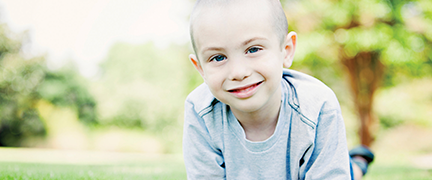When my friend Heather’s daughter was diagnosed with cancer at the age of 9, everything in her world turned upside-down.
She never saw it coming. She simply thought her daughter had a cold and wanted to get her on an antibiotic before they took a trip out of town for the weekend.
But when her pediatrician palpitated her abdomen, she noted that her daughter’s spleen was enlarged.
At first, Heather didn’t know what that meant, so she shrugged it off. After all, she had to get to work and take her daughter back to school.
What’s the big deal about an enlarged spleen, anyway?
This is why she was so confused when her doctor advised her to take her daughter directly to our local Children’s hospital for further evaluation.
Was that even necessary?
Sensing Heather’s uncertainty, her pediatrician quietly took her aside and told her she was concerned that her daughter might have cancer.
A few hours later, Heather’s worst nightmare was confirmed. Her 9-year-old daughter was diagnosed with acute lymphoblastic leukemia.
For the next three years, she experienced things no child should have to endure. Countless hospital stays. Intensive chemotherapy. Infections. Weakness. Fatigue. Loss of hair. Weight gain from steroid use. Bone marrow transplant. Spinal taps. Needles. Isolation from friends. Missed time from school.
The list seems endless.
During that time, I watched my friend Heather walk through the most difficult storm of her life. Nothing could have prepared her to watch her child suffer like that. A million times over, I know she would have taken her place if she could.
As much as I could, I wanted to help my friend. So, I got to work. I had my children make Get Well cards for her daughter. I organized a gift drive to ensure that her daughter had the best Christmas ever. I gave Heather gift cards and care packages. I brought her dinner. I prayed. I wept.
But I still felt helpless.
And the truth was, Heather also felt helpless.
Where would she go from here? What happened after her treatment was over? Would she just resume a normal life? How is that even possible?
Heather worried about her daughter returning to sports. She worried about what to cook her for dinner. For so long, her daughter didn’t want to eat anything but chicken nuggets, because nothing else appealed to her during treatment.
Now what?
This just so happened to be one area where I felt I could actually offer some tangible help to my friend. So, I made it my mission! I created kid-friendly healthy recipes and wrote down tips and tricks for her to try to help her daughter eat well on the days she didn’t feel like it. I went to her house each week and exercised with the two of them. I wanted to show Heather that her daughter could still be a normal kid, in spite of everything she had been through. I wanted to teach her everything I knew that would help her cancer stay in remission. Of course, it was no guarantee – especially since most childhood cancers are linked to DNA mutations and not lifestyle choices – but your health and wellness choices really do matter.
Eating healthy and getting regular exercise can help!!
It has now been five years since Heather’s daughter’s initial diagnosis. She is now a happy, healthy fourteen-year-old girl. She plays soccer for her school and loves to snap chat with her friends. You’d never know that just a few years ago, she battled for her life….
In all my years of working with cancer survivors, I have come to find that many resources are available for adults who battle cancer. Yet, very few exist for children. In fact, a quick literature search on the topic of exercise oncology in adults will reveal more than 15,000 published, peer reviewed, high-quality studies – all supporting the efficacy of exercise. The same search term for pediatric cancer survivors only produces 34 articles.
Thirty-four articles.
I can’t get this out of my head. Our children deserve better!!!
This is why I have taken everything I researched to help my friend Heather and put it into an online program meant specifically for the families of pediatric cancer survivors. I consider it a “how to” guide for nutrition and physical activity.
If your family has been affected by pediatric cancer, I’d like to share this program with you. It is my hope that it will serve as a resource to guide you as you adopt healthy eating and exercise together! You can learn more about the program here.

